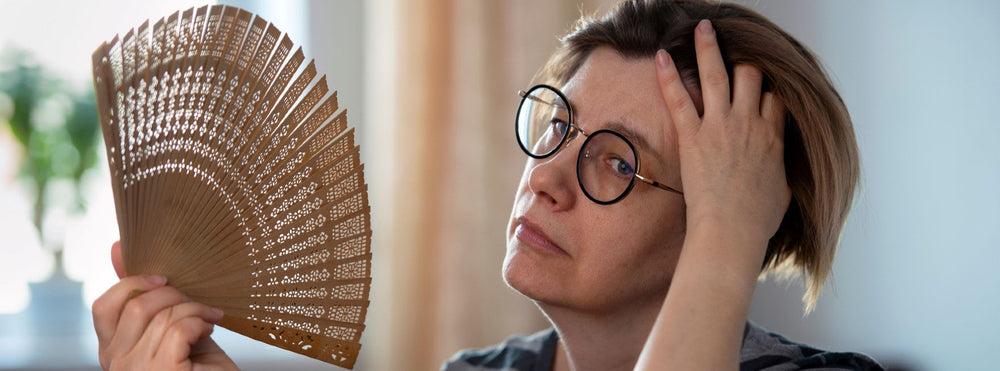Women’s Health Month: Heart-Healthy Tips for Women in Their 40s and Early 50s

I remember when I experienced my first night sweat. It was just a few days before my 50th birthday. I had already been struggling with poor sleep for years, and I knew these were classic signs of impending menopause. What I didn’t know was what to do about it. Like many women, I had been told hormone therapy was dangerous.
That belief stemmed from the early findings of a well-known research effort: the Women’s Health Initiative (WHI). Launched in 1998, the WHI was designed to evaluate the long-term health outcomes of postmenopausal women using hormone replacement therapy (HRT). Hopes were high that HRT would help women live longer, healthier lives. But the study was stopped early in the 2000s when results showed an increased risk of heart disease, blood clots, and breast cancer among women using HRT. Headlines warned of the risks, and hormone therapy quickly fell out of favor.
But here’s the catch: the study design had major flaws. The researchers used estrogen pills rather than patches—and we now know that estrogen absorbed through the skin is processed differently in the body, with a far lower risk of blood clots. Plus, many participants in the study were years or even decades past menopause, making the data hard to apply to women just entering the transition.
Hormone Therapy and Heart Health: What the Research Now Shows
When scientists revisited the WHI data, a different picture emerged. Women who started hormone therapy close to the onset of menopause were not at increased risk for cardiovascular events. In fact, appropriately timed HRT may help prevent osteoporosis, has minimal impact on cancer risk, and may even reduce the risk of heart disease in certain women.
That said, HRT is not for everyone. Women with a personal or family history of breast or reproductive cancers should likely avoid it. And hormone therapy should not be used solely to prevent heart disease—managing other risk factors, like diet, cholesterol, and physical activity, remains far more effective.
Why This Matters for Women in Midlife
Unfortunately, the revised understanding of HRT came too late to reverse the fear-driven headlines or the treatment guidelines that followed. Many women—and their healthcare providers—still haven’t caught up with the current research. That’s a problem.
Not only are we unnecessarily withholding treatments that could dramatically improve quality of life, but the cost of unmanaged menopause symptoms is high. A recent Mayo Clinic study estimates a $1.8 billion loss in work productivity each year, and $26.6 billion annually when medical expenses are included.
If you’re in your 40s or early 50s and experiencing perimenopausal symptoms like poor sleep, hot flashes, or mood swings, talk to your doctor. HRT might be a safe and effective option for you. Your OBGYN is typically the best place to start. If your provider isn’t trained in menopause management—many aren’t—you can find a list of specialists via the North American Menopause Society.
Estrogen, Cholesterol, and Heart Disease Risk
Alongside sleep and mood changes, menopause also brings an increase in cardiovascular risk. One major reason? Estrogen protects the heart—and when levels fall, LDL (bad) cholesterol levels often rise. That’s why this phase of life is a crucial time to focus on heart-healthy habits, especially nutrition.
Eating a diet rich in fiber, antioxidants, and plant sterols can help counteract the cholesterol spike linked to menopause. If you’re looking for a simple place to start, Step One Foods offers clinically formulated products that support healthy cholesterol levels with just two servings a day.
Read the next installment in this series for tips on keeping your heart strong and resilient after menopause: How to keep your heart healthy after menopause.
About Step One Foods
Step One Foods offers convenient, scientifically-formulated foods clinically validated to rapidly reduce cholesterol and improve cardiometabolic health. Real food. Real results. Unapologetically delicious. Learn more at steponefoods.com.

Tested & Proven Results.
- Cardiologist formulated
- Supported by over 500 publications
- Clinically-proven, in a double-blind randomized trial with Mayo Clinic and The University of Manitoba
80% of participants lowered their cholesterol in just 30 days. With just two servings per day, Step One Foods offers a proven-effective way to naturally lower LDL (bad) cholesterol.
Get heart health tips and articles like this, delivered right to your email.
New articles every week.
You may also like...

The Clock You Should Be Paying Attention To (But Probably Aren’t)

The LDL Chart Fueling Confusion Online - And What It Misses

You don’t need to avoid foods with cholesterol…except for these


